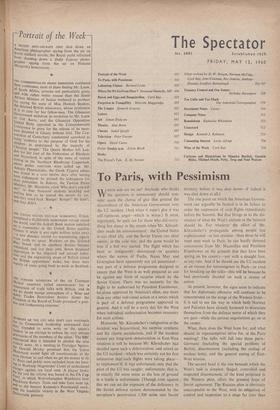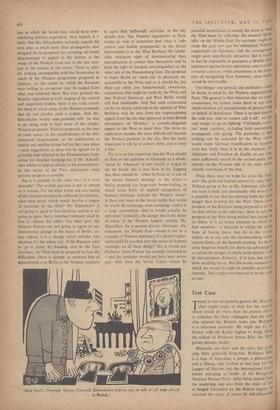To Paris, with Pessimism
HICEI side are we on? Anybody who thinks Wthe question is unnecessary should con- sider again the chorus of glee that greeted the discomfiture of the American Government over the U2 incident. (And when it wasn't glee it was self-righteous anger--which is worse.) It must, regrettably, be spelt out for those who did every- thing but dance in the streets when Mr. Khrush- chev made his announcement : the United States is our chief ally, and the Soviet Union our chief enemy, in the cold war, and the same would be true if a hot war started. The flight which has been so indignantly denounced—in quarters where the names of Fuchs, Nunn May and Greenglass have apparently not yet penetrated— was part of a defence programme designed to ensure that the West is as well prepared as can be against any form of surprise attack by the Soviet Union. There was no necessity for the flight to be authorised by President Eisenhower, let alone approved by America's allies, any more than any other individual action in a series which is part of a defence programme approved in general. And it will be a sorry day for the West when individual authorisation becomes necessary for such actions.
Moreover, Mr. Khrushchev's indignation at' the incident was hypocritical, his surprise synthetic and his claims mendacious, and if the incident causes any long-term deterioration in East-West relations it will be because Mr. Khrushchev had decided upon such a deterioration, and seized on the U2 incident—which was certainly not his first intimation that such flights were taking place— to implement it. It was unfortunate only that the pilot of the U2 was caught: unfortunate, that is, in exactly the same sense as the loss of ground in a battle is unfortunate. (Though even against this we can set the exposure of the deficiency in the Soviet defence system demonstrated by the aeroplane's penetration 1,500 miles into Soviet territory before it was shot down—if indeed it was shot down at all.) The one point on which the American Govern- ment can arguably be faulted is in its failure to order the suspension of such flights immediately before the Summit. But that brings us to the dis- cussion of what the West's attitude at the Summit should be. For whatever the effect of Mr. Khrushchev's propaganda among people less sophisticated—or less resolute—than those he will meet next week in Paris, he can hardly demand concessions from Mr. Macmillan and President Eisenhower on the grounds that they have been spying on his country—not with a straight face, at any rate. And if he should,use the U2 incident as an excuse for intransigence in Paris—or even for breaking up the talks—this will be because he had previously decided on such a course of action.
At present, however, the signs seem to indicate that his diplomatic offensive will continue to be concentrated on the wings of the Western front— it is sad to see the way in which both Norway and Pakistan have already hastened to dissociate themselves from the defence nexus of which they are part—while the serious negotiations go on at the centre.
What, then, does the West hope for, and what should its representatives strive for, at the Paris meeting? The talks will fall into three parts: Germany (including the special problem of Berlin), disarmament (including the ending of nuclear tests), and the general easing of East- West tension.
The second head is the one beneath which the West's task is simplest. Staged, controlled and inspected disarmament, of the kind proposed in the Western plan, offers the greatest hope of Soviet agreement. The Russian plan is obviously unacceptable to the West, with its relegation of control and inspection to a stage far later than one in which the Soviet bloc would have over- whelming military superiority. Nor, indeed, is it likely that Mr, Khrushchev seriously regards his own plan as much more than propaganda, also designed (in its proposals for sweeping, all-round disarmament) to appeal to the nations at the wings of the Western front and to the less reso- lute in the nations at the centre. There is, after all, nothing incompatible with the Soviet plan in much of the Western programme proposed at Geneva; yet the extent to which the Russians were willing to co-operate may be judged from what was achieved there. But even granted the Russian opposition to early staging of the control and inspection system, there is no valid reason for them to refuse some of the Western proposals that do not involve such a system. And Mr. Khrushchev would—and probably will—be wise to go along with at least some of the simpler Western proposals. Western proposals on the uses of outer space, on the establishment of the Dis- armament Organisation, on the notification of missile and satellite firings before they take place —such suggestions as these can be agreed on in principle and referred to the Disarmament Com- mittee for detailed working-out, if Mr. Khrush- chev wishes to appear sincere in his protestations. In this sector of the Paris discussions some genuine progress is possible.
But is it possible in the other two? Is it even desirable? The second question is not as absurd as it sounds. For on what terms can any easing of the German situation be achieved, for instance, other than terms which would involve a degree of surrender by the West? Mr. Khrushchev is not going to agree to free elections, and he is not going to agree that a reunified Germany shall be free to choose her allies. For their part, the Western Powers are not going to agree to any fundamental change in the status of Berlin, un- less, indeed, it is a change which includes free elections for the whole city. If the Russians elect to `go it alone' by handing over to the East Germans, the West must be prepared to face the difficulties. There is already an ominous hiht of appeasement over Berlin in the Western readiness to agree that 'unfriendly activities' in the city should stop. The Western negotiators in Paris would do well to remember that what is 'sub- versive and hostile propaganda' to the Soviet Government is to the West Berliners the irredu- cible minimum right of demonstrating their determination to remain free themselves and to keep the light of freedom unextinguished on the, other side of the Brandenburg Gate. The proposal to make Berlin an 'open city' is obviously un- acceptable to the West, and so it should be; but there are other, less fundamentally obnoxious, concessions that might be made by the West, and that Federal Germany and West Berlin would still find intolerable. And that such concessions are by no means ruled out in the opinion of West Berliners may be seen from the unprecedented appeal from the city that appeared in most British newspapers on Monday: a scarcely-disguised appeal to the West to stand firm. The more re- unification recedes, the more difficult will become the Western position in the city. But the more important it will be to remain there, and to keep it free.
For it is no less important that the West should be firm on the question of Germany as a whole. 'Stand by Adenauer' is not exactly a slogan to stir the blood; but it may have to do. Suppose that there should be—either in Paris, or at one of the future Summit meetings in the series—a Soviet proposal for large-scale horse-trading, in which some form of implied recognition of Eastern Germany formed the Western horse? Is there any beast in the Soviet stable that would be worth the exchange, even assuming—and it is a large assumption—that it would actually be delivered? Ironically, the danger lies in the desire of sonic of the Western leaders, notably Mr. Macmillan, for a general détente. Germany, dis- armament, the Middle East—would it not be a triumph of Western diplomacy if a general agree- ment could be reached over the series of Summit meetings, on all thee things? No, it would not. Professor Seton-Watson has recently reminded us --and the reminder should not have been neces- sary-- that what the Soviet Union means by
And finally, Comrade Mayor, Comrade Khrushchev expects yon to take a full page advert.
in Pravda.' peaceful co-existence is exactly the same as that the West mean by cold war. An eventual Soviet offer on the Middle East, for example, might be made the quid pro quo for substantial Western concessions on Germany, and the arrangement might seem superficially attractive. But it would in fact be impossible to guarantee a Middle East settlement against Soviet subversion, which certainly continue, while concessions in the direc- tion of recognising East Germany, once made, would be irrevocable.
Two things—one general, one particular--must be borne in mind by the Western negotiators ID Paris. The general is that wherever else we nlake concessions, we cannot make them in any area which involves our abandonment of proselytising on behalf of democracy. There is no half-time In the cold war, and we cannot call it off: we earl only resign, or go on fighting. 'Unfriendly Will' ties' must continue, including both unremitting propaganda and spying. The particular is that nothing, can be conceded by the West w 1101 would make German reunification in freedoM even less likely than it is at the moment. Dr. Adenauer and President de Gaulle, at an rate' seem sufficiently seized of the second point. hot nobody on the Western side of the table seems' entirely convinced of the first.
What, then, may we hope for from the Surri' mit? The grim but realistic answer is: very little. Without going as far as Dr. Adenauer, who did not want it held, and presumably still doesn't. it is possible to say that the meeting holds far more danger than promise for the West. There is to prospect of the Russians being prepared to let LIP on their efforts in the cold war: there is only the prospect of the West being tricked into letting tiP on theirs. It is an ironic situation in which "e find ourselves: a situation in which . the truest hope of lasting peace may lie in the 'riot failure; or at any rate the circumscribing viih narrow limits, of the Summit meeting. To throw away long-run benefit for short-run advantage 11 an action the danger of which varies directly "jib its attractiveness. Posterity, it is true, has neNer done anything for. us. But this is one occasion on which we would be right to consider posteritys interests. They might even turn out to be the sang as ours.





































 Previous page
Previous page